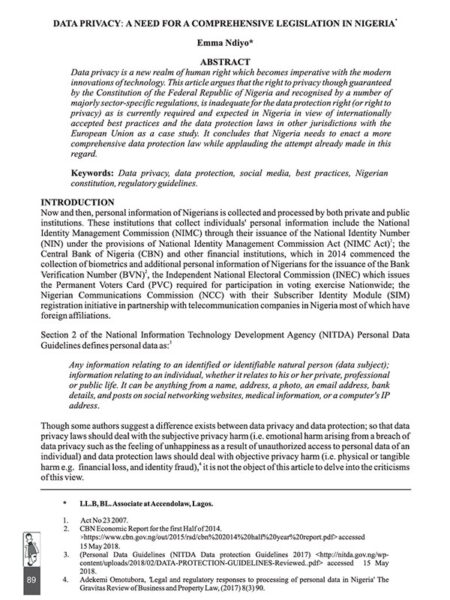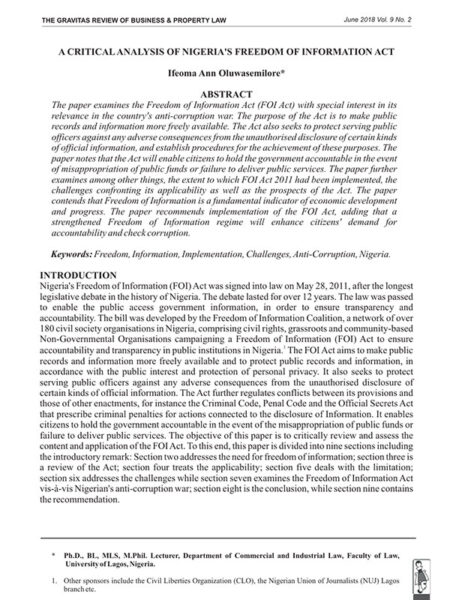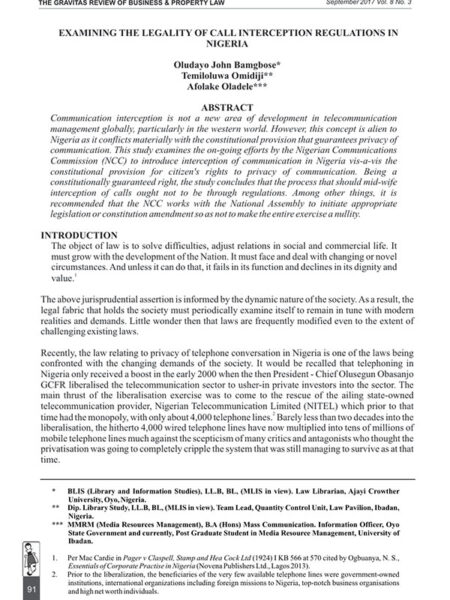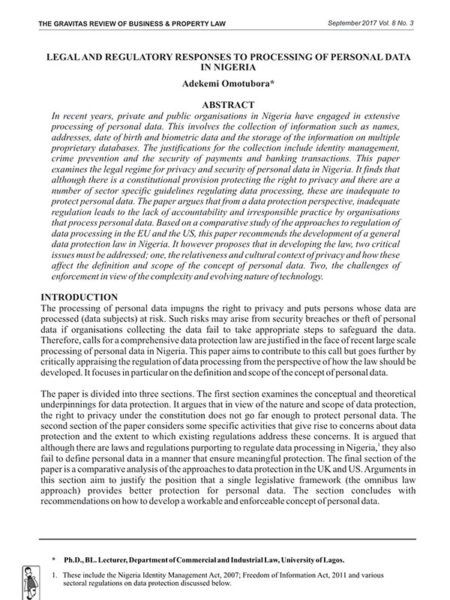-

Data Privacy: A Need for a Comprehensive Legislation in Nigeria
0₦2,500.00Emma Ndiyo, Associate, Accendolaw in her article, Data Privacy: A Need for a Comprehensive Legislation in Nigeria notes that ‘Data is the new Oil’ and Data Privacy is a new realm of human right which becomes imperative with the unprecedented innovations in technology and the threats of fraud, phishing scams, and identity theft. She argues that the right to privacy though guaranteed under the Constitution and recognised by some sector-specific regulations, is inadequate given internationally accepted best practices. She examines the EU’s General Data Protection Regulation (GDPR) adopted in May 2018 which compelled big data entities such as Facebook, Google and Twitter to adjust their Terms of Use and Privacy Policy, and concludes that there is the need for an overarching data protection law which would not only enhance data privacy but regulate the collection and processing of personal data.
-

A Critical Analysis of Nigeria’s Freedom of Information Act
0₦2,500.00Dr. Ifeoma Oluwasemilore, Lecturer, Department of Commercial and Industrial Law, Faculty of Law, University of Lagos in her article, A Critical Analysis of Nigeria’s Freedom of Information Act, examines the Freedom of Information Act (FOI Act) with special interest in its relevance in the country’s anti-corruption war. She examines the extent to which FOI Act had been implemented, the challenges confronting its applicability as well as the prospects of the Act. She contends that Freedom of Information is a fundamental indicator of economic development and progress, and recommends a strengthened implementation of the Act, adding that a strong Freedom of Information regime will enhance citizens’ demand for accountability and check corruption.
-

Examining the Legality of Call Interception Regulations in Nigeria
0₦2,500.00Oludayo Bamgbose (Law Librarian, Ajayi Crowther University), Temiloluwa Omidiji (Quantity Control Unit, Law Pavilion) and Afolake Oladele (Information Officer, Oyo State Government) in their article, “Examining the Legality of Call Interception Regulations in Nigeria” appraise the on-going efforts by the Nigerian Communications Commission (NCC) to introduce Regulations for interception of communication in the country. Bamgbose et al argue that while lawful interception of communication is commonplace even in advanced democracies to prevent, and aid investigation of crimes including terrorism, the current efforts by the NCC will have to contend with the constitutional provision protecting telephone conversations and telegraphic communications. In the end, the NCC may be unable to achieve its objectives with a Regulation, without an amendment of the constitution, or enactment of a law that is reasonably justifiable in a democratic society.
-

Legal and Regulatory Responses to Processing of Personal Data in Nigeria
0₦2,500.00Dr. Adekemi Omotubora, Lecturer, Department of Commercial and Industrial Law University of Lagos, in her article, “Legal and Regulatory Responses to Processing of Personal Data in Nigeria”, considers the justifications for collection of personal data which include identity management, crime prevention and the security of payments and banking transactions. She argues that although there is a constitutional provision protecting the right to privacy and there are a number of sector specific guidelines regulating data processing, there is no general data protection law in Nigeria, and this leads to a lack of accountability and irresponsible practice by organisations that process personal data. Based on a comparative study of the approaches to regulation of data processing in the EU and the US, she recommends the development of a data protection law in Nigeria, such law taking into consideration the relativeness and cultural context of privacy, and how these affect the definition and scope of the concept of personal data.
The Gravitas Review of Business & Property Law



